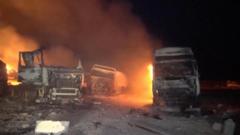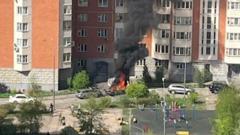The bombing of a hospital and market in Old Fangak has resulted in at least seven fatalities, highlighting the fragile peace in South Sudan and the potential resurgence of violence as political tensions rise between President Salva Kiir and Vice-President Riek Machar.
Hospital and Market Bombing in South Sudan Claims Seven Lives

Hospital and Market Bombing in South Sudan Claims Seven Lives
A deadly attack on a hospital and market in South Sudan raises fears of renewed civil conflict amid escalating tensions between political leaders.
At least seven individuals have lost their lives following a bombing targeting a hospital and market in South Sudan, as reported by the medical charity Doctors Without Borders (MSF). The attack involved helicopter gunships dropping bombs on the pharmacy of MSF's hospital in Old Fangak, resulting in significant destruction and a subsequent barrage on the town lasting approximately 30 minutes. Following this, a drone strike targeted a local market, leading to over 20 people being injured.
MSF stated that this hospital is the sole medical facility serving Fangak County, which is home to over 110,000 residents, and all available medical supplies were obliterated in the attack. The charity condemned the incident as "a clear violation of international humanitarian law," emphasizing the dire consequences for the local population.
Concerns about a resurgence of civil war in South Sudan have intensified, driven by a continuing conflict between President Salva Kiir and Vice-President Riek Machar. United Nations envoy Nicholas Haysom has indicated that the situation is precarious and poses threats of escalating violence. Just hours prior to the bombing, South Sudan's army chief, Paul Majok Nang, threatened retaliatory actions following the hijacking of several barges, which he attributed to a militia associated with Machar.
Machar, who was arrested in March alongside various associates for allegedly inciting rebellion, has yet to respond to Nang's claims. The government has also designated certain counties as hostile, indicative of potential ethnic strife involving the country's two primary factions.
Since achieving independence from Sudan in 2011, South Sudan has grappled with instability. A civil war erupted in 2013 after Kiir dismissed Machar, leading to significant casualties, including an estimated 400,000 deaths and the displacement of 2.5 million individuals. Although a peace agreement was established in 2018, and a unity government was formed with both leaders at the forefront, delayed elections and failure to disband militias have perpetuated instability.
The current unrest traces back to earlier incidents this year, where the White Army militia clashed with the national army, culminating in violence that claimed numerous lives, including that of a high-ranking general. Rights organizations have called for an immediate cessation of military attacks in civilian areas, urging a focus on preserving peace and stability in South Sudan.






















